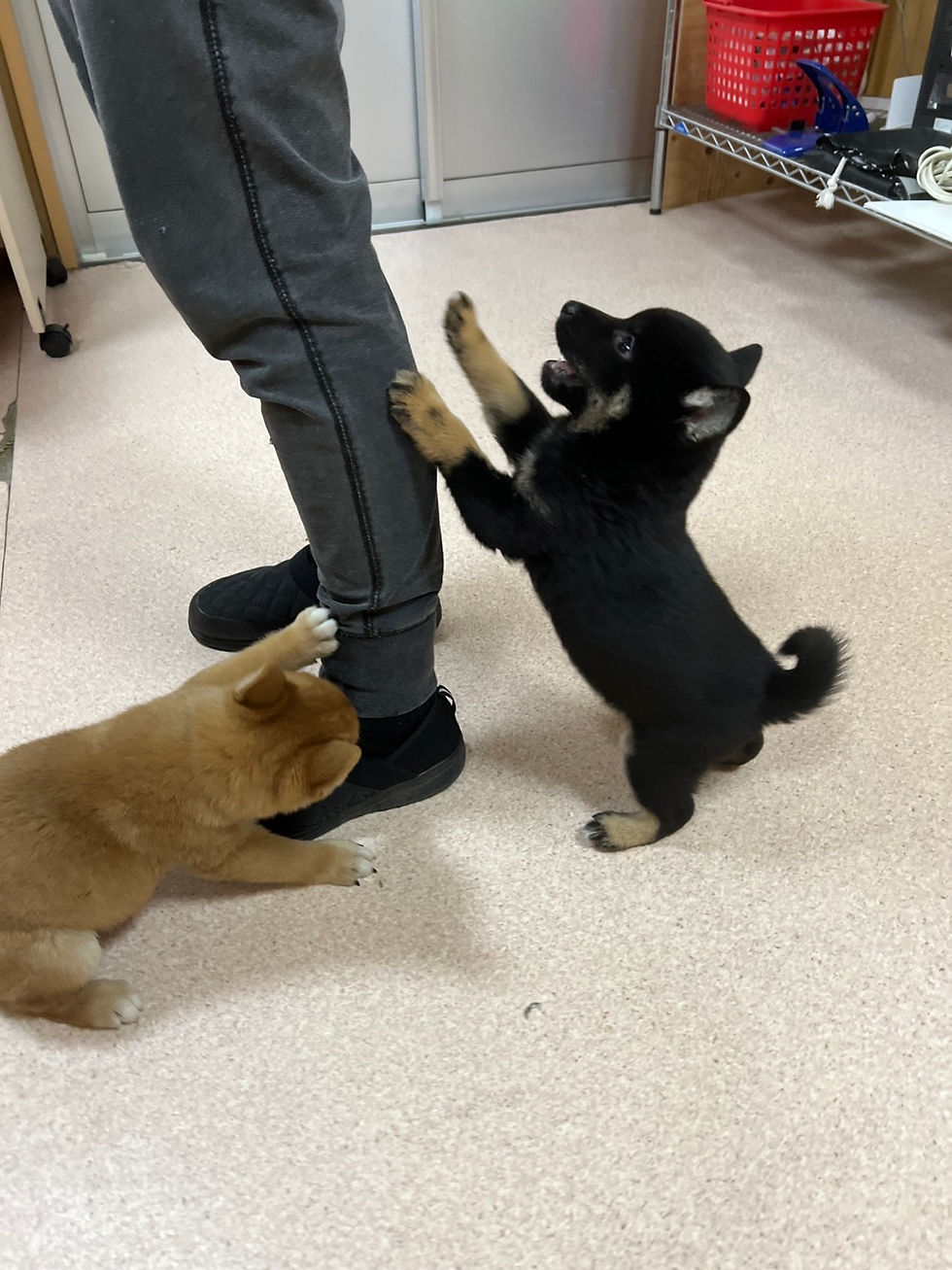
Japanese Dogs and Kenji Miyazawa
Dogs kept by humans adapt to human life and exhibit behaviors considered favorable by humans. However, what constitutes favorable behavior to humans may vary from person to person.
Typically, desired behaviors in pet dogs include being well-behaved whether indoors or in a kennel, not barking unnecessarily or biting people, calming people's hearts by their presence, and having an amiable disposition.

Kenji Miyazawa, a renowned Japanese fairy tale writer and poet, left behind many masterpieces around 1900. Some of his works feature dogs, such as poems titled "Inu" ("Dog") and the dog owned by the protagonist in "Night on the Galactic Railroad."

Within Miyazawa's poetry lies an idealized image of humanity:
Unbeaten by the rain
Unbeaten by the wind
Bested by neither snow nor summer heat
Strong of body
Free of desire
Never angry
Always smiling quietly
Dining daily on four cups of brown rice
Some miso and a few vegetables
Observing all things
Leaving myself out of account
With dispassion
But remembering well
Living in a small, thatched-roof house
In the meadow beneath a canopy of pines
Going east to nurse the sick child
Going west to bear sheaves of rice for the weary mother
Going south to tell the dying man there is no cause for fear
Going north to tell those who fight to put aside their trifles
Shedding tears in time of drought
Wandering at a loss during the cold summer
Called useless by all
Neither praised
Nor a bother
Such is the person
I wish to be

It's conceivable Miyazawa also embodied aspects of a Buddhist or a seeker.

Could such an ideal human image fit a dog as well? Could a dog become desirable? Let's try implementing it partially since it's not entirely feasible.
For instance, imagine a couple arguing. The dog might crouch in the middle of the room, as if saying, "Stop it, it's pointless." This might actually halt the argument. Anyone who has owned a dog might have experienced this; dogs can quell feelings of anger. Other parts of the poem might also suit a dog: having a robust body, lacking desires, never getting angry, observing and understanding well, not seeking praise, and not being troubled. Clearly, there are many similarities between good humans and good dogs.
I have seen dogs raised to match the ideals outlined in the poem: "Free of desire", "Never angry", " In the meadow beneath a canopy of pines", and " Nor a bother". This results from owners treating them with tenderness. Striking them harshly or for training purposes is strictly prohibited.

There must be a maintained order between dogs and humans. Dogs are not humans; they have their own behavioral principles. The hierarchical structure within a wolf pack's society directly translates into the order between dogs and humans. What a mother dog does when raising her puppies is teaching them about hierarchy. In the wolf world, there's a leader in the pack, and a hierarchy forms within it. This enables the pack to hunt. Despite being separated from wolves or being actual wolves, the characteristics of dogs remain unchanged after many days. It's crucial for the owner to maintain a leadership position over the dog.
As mentioned above, wolves or their relatives have become attached to humans and domesticated by them. The behavioral style of dogs preserves that of wolves. Some might disagree, but observing packs of stray dogs confirms that dogs' behavior closely mirrors that of wolves.

Some dogs cannot be trained. They bark incessantly whenever someone passes by. How they have been raised matters. They run around the house as they please during the day and sleep in their owner's bed at night. For the owner, the dog might just be a moving toy. As long as it's cute, it's fine. The barking will continue as long as the dog lives. To the dog, people walking outside and visitors ringing the doorbell are intruders. This is perceived as an intrusion into their territory. Dogs are territorial animals and will repel intruders.
How can this be corrected? Firstly, create an environment where the dog can remain calm. Dogs find peace by retreating into their dens, just like wolves. During the day, they retreat into their dens. These dens are just big enough for them. It's easier to repel intruders and prevent entry from a small space. Allowing them to roam freely in a large yard or inside the house is akin to removing this defensive barrier, making them restless.
A large yard becomes the territory the dog must protect. The same goes for roaming inside the house. They remain on edge to protect their territory. If an intruder approaches, they bark. If the intruder enters their territory, they bite. When the mailman rings the bell, the dog in the yard rushes over and bites. If a visitor opens the door and enters, the dog bites. There are many instances of this.
The solution is the same. Simply put, don't allow the dog to roam freely in the house or yard. Except for when playing with people, keep the dog in a kennel or crate. This restricts their movement and provides a sense of security, much like a wolf's life intertwined with the dog's. Dogs' behavior and human behavior differ. Their senses also differ. When visitors come, the owner acts as the leader and instructs them to calm down.

There are dogs that live with being "Neither praised" and "Nor a bother”.
Conversely, there are many owners who are greedy, high-strung, unobservant, and constantly angry.
Encountering or nurturing a well-trained dog with qualities such as being "Strong of body", "Leaving myself out of account", "Free of desire", "Never angry", "With dispassion", "But remembering well", and "Nor a bother" would be a great fortune. Unfortunately, humans cannot attain such a state.
Any food business operating in India must register with the Food Safety and Standards Authority of India (FSSAI registration) in order to guarantee compliance with food safety regulations. The Food Safety and Standards Authority of India (FSSAI) regulates and governs the food industry to guarantee the safety of consumables. Obtaining FSSAI registration is a must and is a straightforward procedure. Through this registration, all businesses—regardless of size—gain credibility and the trust of their clients. The FSSAI registration process indicates a commitment to quality and hygienic standards, which increases the marketability of food products. Not only is it a legal need, but it also makes rapid growth and clientele access possible. In conclusion, becoming registered with the FSSAI is more than…